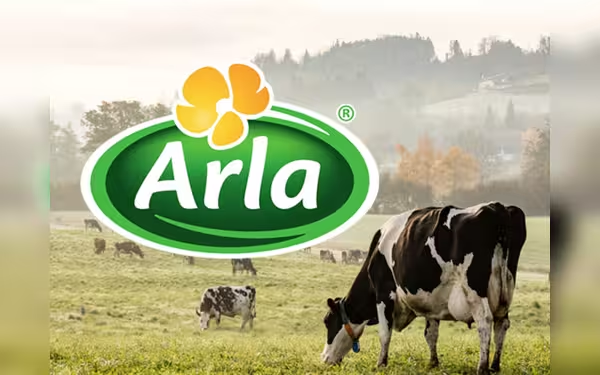Sunday, December 22, 2024 03:52 PM
Arla Foods Faces Boycott Over Bovaer Feed Trial Controversy
- Arla's Bovaer trial aims to reduce methane emissions.
- Critics raise concerns over synthetic feed additives.
- Calls for boycott highlight sustainability debates.
 Image Credits: tribune.com.pk
Image Credits: tribune.com.pkArla Foods faces backlash over Bovaer feed trial aimed at reducing methane emissions, prompting calls for a boycott amid health and environmental concerns.
In recent weeks, the agricultural community in the United Kingdom has been abuzz with discussions surrounding Arla Foods' latest initiative involving the use of Bovaer, a feed additive aimed at reducing methane emissions from dairy cows. This trial, which is being promoted as a step towards more sustainable farming practices, has not been without its controversies. While Arla asserts that the Bovaer feed will assist British farmers in making a smoother transition to environmentally friendly methods, the response from various environmental and health advocates has been overwhelmingly negative.
Bovaer is engineered to cut down enteric methane emissions from cows by an impressive 27% on average. Methane, a potent greenhouse gas, is a significant contributor to climate change, and reducing its emissions is crucial for achieving global climate goals. However, the introduction of Bovaer has raised eyebrows among many who question the long-term effects of such additives on animal health and the environment.
Critics argue that while the intention behind Bovaer may be noble, the potential risks associated with its use cannot be overlooked. Environmentalists are particularly concerned about the implications of introducing synthetic additives into the food chain, fearing that it may lead to unforeseen consequences for both livestock and consumers. Health advocates have also voiced their apprehensions, emphasizing the need for thorough research and testing before such products are widely adopted.
The backlash has led to growing calls for a boycott of Arla's trial, with many urging consumers to reconsider their support for the company until more transparent and comprehensive studies are conducted. This situation highlights a broader debate within the agricultural sector about the balance between innovation and sustainability. As farmers strive to meet the increasing demand for dairy products while also addressing environmental concerns, the path forward remains fraught with challenges.
The controversy surrounding Arla's Bovaer feed trial serves as a reminder of the complexities involved in modern agriculture. While the goal of reducing methane emissions is undoubtedly important, it is equally vital to ensure that the methods employed are safe and sustainable in the long run. As discussions continue, it is essential for all stakeholders—farmers, consumers, and policymakers—to engage in open dialogue and work collaboratively towards solutions that benefit both the environment and public health.













